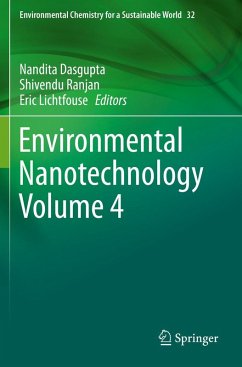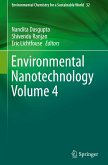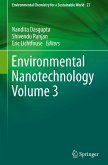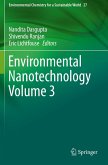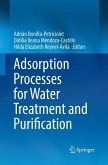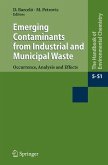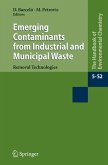Environmental Nanotechnology Volume 4
Herausgegeben:Dasgupta, Nandita; Ranjan, Shivendu; Lichtfouse, Eric
Environmental Nanotechnology Volume 4
Herausgegeben:Dasgupta, Nandita; Ranjan, Shivendu; Lichtfouse, Eric
- Broschiertes Buch
- Merkliste
- Auf die Merkliste
- Bewerten Bewerten
- Teilen
- Produkt teilen
- Produkterinnerung
- Produkterinnerung
This book presents comprehensive reviews on the latest developments of nanotechnologies to detect and remove pollutants in water, air and food. Polymer nanocomposites, nanoparticles from microbes and application of nanotechnologies for desalination and agriculture are also addressed. Pollution of water and air by contaminants and diseases is a major health issue leading globally to millions of deaths yearly, according to the World Health Organization, and such an issue requires advanced methods to clean environmental media.
Andere Kunden interessierten sich auch für
![Environmental Nanotechnology Volume 4 Environmental Nanotechnology Volume 4]() Environmental Nanotechnology Volume 481,99 €
Environmental Nanotechnology Volume 481,99 €![Environmental Nanotechnology Volume 3 Environmental Nanotechnology Volume 3]() Environmental Nanotechnology Volume 381,99 €
Environmental Nanotechnology Volume 381,99 €![Environmental Nanotechnology Volume 3 Environmental Nanotechnology Volume 3]() Environmental Nanotechnology Volume 381,99 €
Environmental Nanotechnology Volume 381,99 €![Adsorption Processes for Water Treatment and Purification Adsorption Processes for Water Treatment and Purification]() Adsorption Processes for Water Treatment and Purification114,99 €
Adsorption Processes for Water Treatment and Purification114,99 €![Pollutants in Buildings, Water and Living Organisms Pollutants in Buildings, Water and Living Organisms]() Pollutants in Buildings, Water and Living Organisms81,99 €
Pollutants in Buildings, Water and Living Organisms81,99 €![Emerging Contaminants from Industrial and Municipal Waste Emerging Contaminants from Industrial and Municipal Waste]() Emerging Contaminants from Industrial and Municipal Waste161,99 €
Emerging Contaminants from Industrial and Municipal Waste161,99 €![Emerging Contaminants from Industrial and Municipal Waste Emerging Contaminants from Industrial and Municipal Waste]() Emerging Contaminants from Industrial and Municipal Waste188,99 €
Emerging Contaminants from Industrial and Municipal Waste188,99 €-
-
-
This book presents comprehensive reviews on the latest developments of nanotechnologies to detect and remove pollutants in water, air and food. Polymer nanocomposites, nanoparticles from microbes and application of nanotechnologies for desalination and agriculture are also addressed. Pollution of water and air by contaminants and diseases is a major health issue leading globally to millions of deaths yearly, according to the World Health Organization, and such an issue requires advanced methods to clean environmental media.
Produktdetails
- Produktdetails
- Environmental Chemistry for a Sustainable World 32
- Verlag: Springer / Springer International Publishing / Springer, Berlin
- Artikelnr. des Verlages: 978-3-030-26670-7
- 1st edition 2020
- Seitenzahl: 424
- Erscheinungstermin: 26. August 2021
- Englisch
- Abmessung: 235mm x 155mm x 22mm
- Gewicht: 728g
- ISBN-13: 9783030266707
- ISBN-10: 3030266702
- Artikelnr.: 60731052
- Herstellerkennzeichnung Die Herstellerinformationen sind derzeit nicht verfügbar.
- Environmental Chemistry for a Sustainable World 32
- Verlag: Springer / Springer International Publishing / Springer, Berlin
- Artikelnr. des Verlages: 978-3-030-26670-7
- 1st edition 2020
- Seitenzahl: 424
- Erscheinungstermin: 26. August 2021
- Englisch
- Abmessung: 235mm x 155mm x 22mm
- Gewicht: 728g
- ISBN-13: 9783030266707
- ISBN-10: 3030266702
- Artikelnr.: 60731052
- Herstellerkennzeichnung Die Herstellerinformationen sind derzeit nicht verfügbar.
Dr. Nandita Dasgupta has vast working experience in nanoscience and is working as Assistant Professor at Department of Biotechnology, Institute of Engineering and Technology, Lucknow, India. She has worked on Mesenchymal stem cell derived exosomes for the treatment of uveitis. She has successfully engineered micro-vehicles for model drug molecules. Her areas of interest include nanomaterial fabrication and its applications in medicine, food, environment, agriculture and biomedical.She is the associate editor of Environmental Chemistry Letters. She has received several awards and recognitions from different national and international organizations. Dr. Shivendu Ranjan is scientist at the DST-Centre for Policy Research, Lucknow, India. He is also serving as a senior research associate, adjunct, at the Faculty of Engineering and Built Environment, University of Johannesburg, South Africa. His research interests include nanotechnology, nanomedicine, science policy and diplomacy.He is associate editor of Environmental Chemistry Letters and editorial board member of Biotechnology and Biotechnological Equipment. He has received 20 awards and honors. Dr. Eric Lichtfouse is an environmental chemist working at the University of Aix-Marseille, France. He has invented carbon-13 dating. He is teaching scientific writing and communication, and has published the book Scientific Writing for Impact Factors. He is founder and Chief Editor of scientific journals and series in environmental chemistry and agriculture. He got the Analytical Chemistry Prize from the French Chemical Society, the Grand Prize of the Universities of Nancy and Metz, and a Journal Citation Award by the Essential Indicators.
Preface.- About the Editors.- 1. Nanotechnology for water and wastewater treatment using graphene semiconductor composite materials (Penny P. Govender).- 2. Dyes depollution of water using porous TiO2-based photocatalysts (Jean-Luc Blin).- 3. Application of nanobiosensors in food safety monitoring (Ragh HV).- 4. Translational approach of modification of functional properties of nano porous membranes for the desalination of water (Velayudhaperumal Chellam Padmanaban).- 5.Nanotechnology in wheat production and protection (Prem Lal Kashyap).- 6. New drugs for bad bugs: bioprospection of new nanoparticles and specialized metabolites from Actinobacteria (Analía Álvarez).- 7. Titanium oxide-based nanomaterials with photocatalytic applications in environmental chemistry (Santiago Gómez-Ruiz).- 8. Polymer nanocomposites: synthesis and characterization (A L Sharma). 9. Application of nanotechnology in agriculture (Pragati Pramanik).- 10. Nanomaterial-based sensor for air pollution control (Pradip Kar).
Preface.- About the Editors.- 1. Nanotechnology for water and wastewater treatment using graphene semiconductor composite materials (Penny P. Govender).- 2. Dyes depollution of water using porous TiO2-based photocatalysts (Jean-Luc Blin).- 3. Application of nanobiosensors in food safety monitoring (Ragh HV).- 4. Translational approach of modification of functional properties of nano porous membranes for the desalination of water (Velayudhaperumal Chellam Padmanaban).- 5.Nanotechnology in wheat production and protection (Prem Lal Kashyap).- 6. New drugs for bad bugs: bioprospection of new nanoparticles and specialized metabolites from Actinobacteria (Analía Álvarez).- 7. Titanium oxide-based nanomaterials with photocatalytic applications in environmental chemistry (Santiago Gómez-Ruiz).- 8. Polymer nanocomposites: synthesis and characterization (A L Sharma). 9. Application of nanotechnology in agriculture (Pragati Pramanik).- 10. Nanomaterial-based sensor for air pollution control (Pradip Kar).

